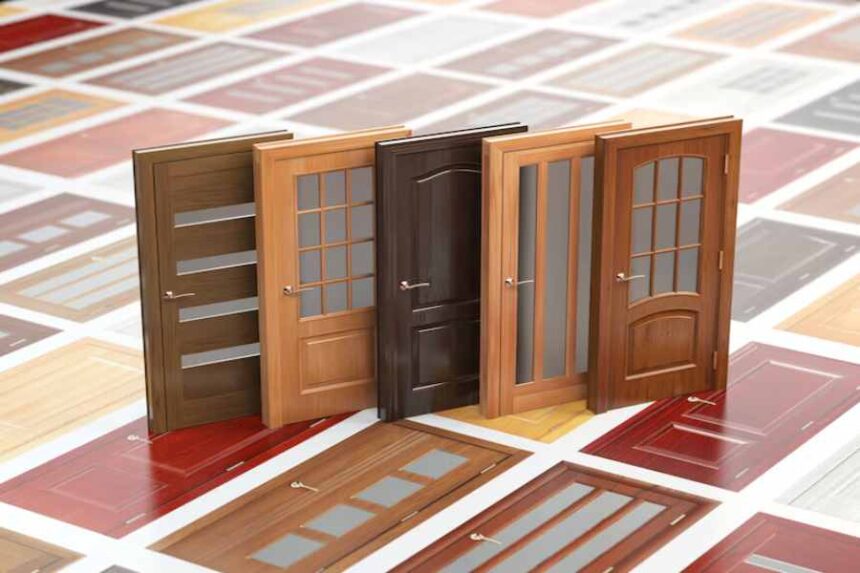Wood has been a fundamental material in architecture for centuries, and its relevance in the commercial sector remains as strong as ever. Despite the rise of modern materials like steel and fiberglass, wood doors continue to be a preferred choice for many businesses due to their aesthetic appeal, durability, and versatility. From boutique retail stores to large corporate offices, wooden doors provide a sense of warmth and sophistication that few other materials can match.
- Strength and Durability: The Practical Advantages of Wood Doors
- Versatility in Design: Customization and Aesthetic Appeal
- Environmental Benefits: Wood as a Sustainable Choice
- Fire-Rated Wood Doors: Safety Without Compromise
- Cost-Effectiveness: A Smart Investment for Businesses
- Final Thoughts: The Timeless Choice for Commercial Spaces
Beyond aesthetics, wood offers a level of customization that is unparalleled. Businesses can choose from a wide array of wood species, stains, and finishes, allowing them to create a unique look that aligns with their brand identity. Additionally, wood can be easily refinished or repaired, ensuring longevity even in high-traffic environments. This adaptability makes wood an excellent long-term investment for companies looking to maintain a polished and professional appearance.
Furthermore, wood has a timeless quality that transcends design trends. While other materials may fall in and out of favor, wood maintains its status as a premium choice for commercial applications. This is particularly beneficial for businesses that wish to project a sense of permanence and reliability to their customers and clients.
Strength and Durability: The Practical Advantages of Wood Doors
One of the primary reasons businesses choose wood doors is their strength and durability. Contrary to common misconceptions, high-quality wood doors can withstand significant wear and tear, making them ideal for busy environments such as hotels, hospitals, and office buildings. Engineered wood options, in particular, offer enhanced resilience against warping and cracking, ensuring that the doors remain structurally sound for years.
Another advantage of wood doors is their ability to provide excellent insulation, both in terms of temperature and soundproofing. Solid core wood doors, for instance, help regulate indoor temperatures by preventing heat loss, which can contribute to energy efficiency in commercial buildings. Additionally, their dense construction effectively reduces noise, an essential factor for businesses operating in bustling environments.
Moreover, advancements in wood treatment and protective coatings have significantly increased the longevity of wood doors. Modern sealing techniques enhance resistance to moisture and pests, addressing some of the traditional concerns associated with wood. With proper maintenance, businesses can expect their wood doors to remain functional and visually appealing for decades.
Versatility in Design: Customization and Aesthetic Appeal
The design flexibility of wood doors is another major factor that keeps them in demand for commercial use. Unlike metal or fiberglass doors, which often have limited styling options, wood can be crafted into a variety of designs, from classic paneled looks to contemporary minimalist styles. This allows businesses to choose doors that complement their architectural vision and enhance the overall ambiance of their space.
Wood doors also provide businesses with the ability to incorporate intricate carvings, inlays, and glass panels for an added touch of elegance. Whether a business wants to evoke a sense of tradition or embrace a modern aesthetic, wood doors can be tailored to meet these specific design needs. Moreover, they can be painted or stained in virtually any color, further expanding their adaptability to different commercial settings.
Selecting the right wood doors for a business requires careful consideration of key factors such as wood species, fire ratings, and core types, all of which influence durability, security, and aesthetics. The choice between solid core, hollow core, or engineered wood construction affects longevity and performance, particularly in high-traffic environments. Finishes and customization options also play a crucial role, as the right stain or paint can enhance branding and interior design. Additionally, factors like fire safety regulations, soundproofing capabilities, and resistance to moisture or insects should be evaluated based on the business’s location and operational needs. A well-chosen wood door not only enhances functionality but also reinforces a professional image, making it a valuable long-term investment.
Environmental Benefits: Wood as a Sustainable Choice
Sustainability has become a crucial consideration for businesses, and wood doors present an eco-friendly option compared to some synthetic materials. When sourced responsibly from certified suppliers, wood is a renewable resource that contributes to environmentally conscious construction practices. Many manufacturers now prioritize using wood from sustainable forests, ensuring that natural resources are preserved for future generations.
Additionally, wood doors have a lower carbon footprint compared to metal and plastic alternatives. The energy required to produce and process wood is significantly lower than that of steel or aluminum, making it a more environmentally responsible option. Businesses looking to obtain LEED certification or meet other sustainability standards can benefit from incorporating wood doors into their commercial spaces.
Recyclability is another key advantage of wood doors. Unlike many composite materials that end up in landfills, wood can be repurposed or recycled, extending its life cycle and reducing waste. This aligns with the growing movement toward circular economy principles, where materials are reused and repurposed rather than discarded.
Fire-Rated Wood Doors: Safety Without Compromise
Fire safety is a top priority in commercial buildings, and wood doors can meet stringent fire-rating requirements while maintaining their visual appeal. Many businesses may not realize that wood doors can be manufactured to provide substantial fire resistance, often meeting or exceeding industry standards. Fire-rated wood doors are designed with fire-resistant cores and specialized seals to slow down the spread of flames and smoke.
The presence of fire-rated wood doors in commercial spaces can be crucial for compliance with local building codes and insurance requirements. These doors are tested and certified to withstand fire for specified durations, typically ranging from 20 to 90 minutes. By integrating fire-rated wood doors, businesses can enhance safety measures without sacrificing the warm and inviting aesthetics that wood provides.
Moreover, modern fire-rated wood doors come with additional features such as self-closing mechanisms and smoke-resistant seals. These enhancements further improve the overall safety of a building, ensuring that occupants have adequate time to evacuate in case of an emergency. Investing in fire-rated wood doors is a proactive step toward balancing safety with sophisticated design.
Cost-Effectiveness: A Smart Investment for Businesses
While wood doors may have a higher upfront cost compared to some alternatives, their long-term value makes them a cost-effective investment for businesses. The durability and longevity of high-quality wood doors mean that companies can avoid frequent replacements, ultimately saving money over time. Unlike cheaper materials that degrade quickly, wood maintains its integrity even with prolonged use.
Additionally, the ease of maintenance associated with wood doors contributes to their cost-effectiveness. Minor scratches and dents can be repaired without the need for full replacements, extending the lifespan of the doors. This reduces ongoing maintenance expenses, making wood doors a financially sound choice for businesses looking to optimize their operational costs.
Another factor to consider is the increased property value associated with high-end wooden doors. Commercial spaces with well-maintained wood doors often project a more prestigious and inviting image, which can positively impact customer perception and even rental or resale values. Businesses looking for a balance between aesthetics, functionality, and long-term financial benefits will find wood doors to be a worthwhile investment.
Final Thoughts: The Timeless Choice for Commercial Spaces
Wood doors have stood the test of time in commercial applications, offering a blend of durability, design flexibility, and sustainability. While newer materials have entered the market, wood continues to hold its ground as a preferred choice for businesses seeking both functionality and aesthetic excellence. With advancements in manufacturing and fire safety, wood doors remain a reliable option for modern commercial environments.
From their ability to enhance a building’s ambiance to their contributions to energy efficiency and sustainability, wood doors provide a comprehensive solution for businesses of all sizes. By carefully selecting high-quality wood doors and ensuring proper maintenance, companies can enjoy the benefits of this timeless material for decades.
As businesses weigh their options for commercial doors, it becomes evident that wood remains an unparalleled choice. Whether prioritizing style, security, or environmental impact, wood doors deliver on all fronts, solidifying their status as a top-tier material in the industry.




